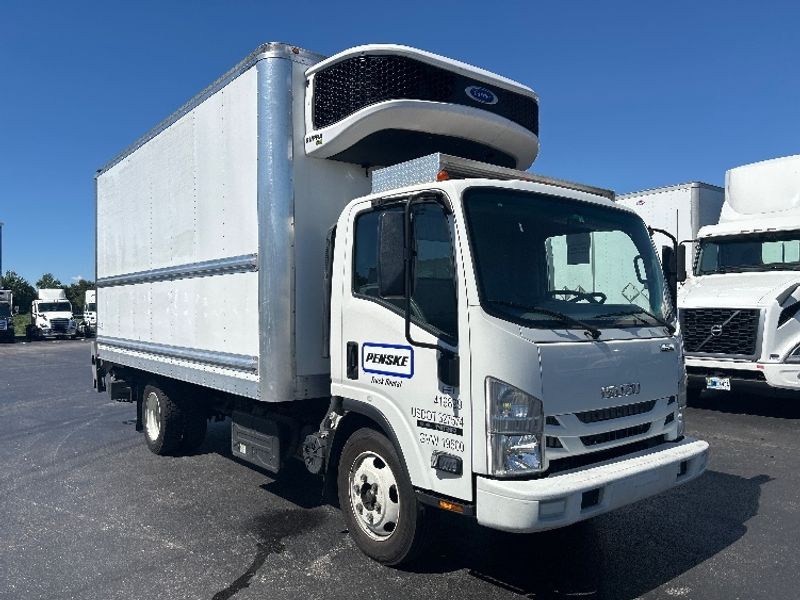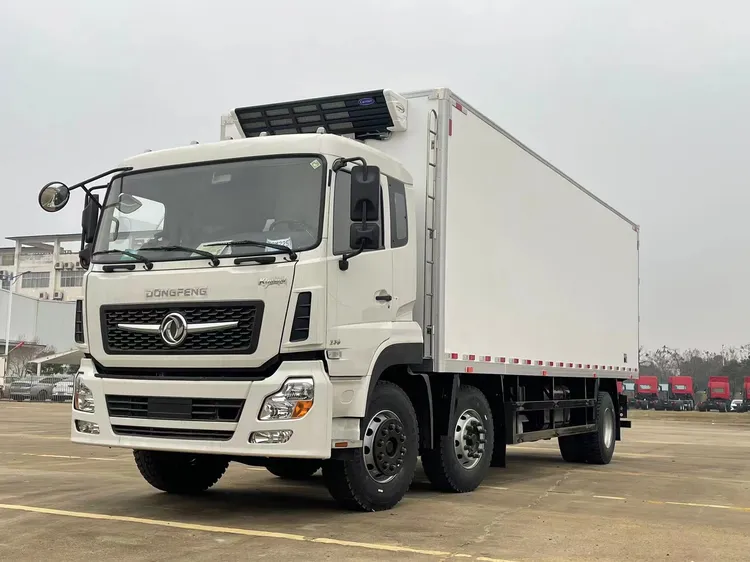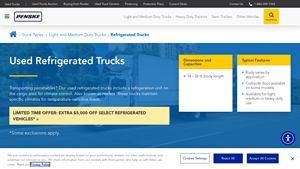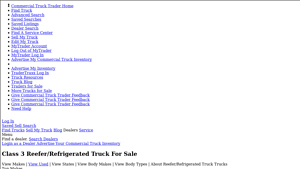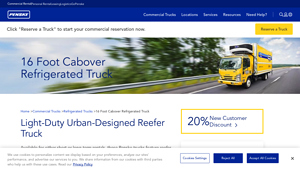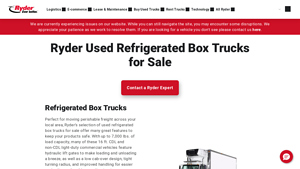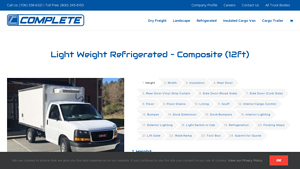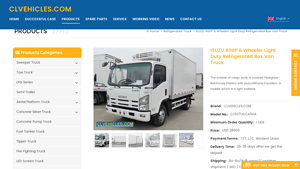Introduction: Navigating the Global Market for light Duty Refrigerated Truck
In the dynamic landscape of global commerce, sourcing light duty refrigerated trucks poses a significant challenge for businesses aiming to maintain the integrity of temperature-sensitive goods. Whether you are a distributor of fresh produce in South America or a pharmaceutical supplier in Europe, the need for reliable refrigerated transport is paramount. This guide serves as a comprehensive resource for international B2B buyers, offering insights into various types of light duty refrigerated trucks, their applications across industries, and strategies for effective supplier vetting.
Navigating this market requires an understanding of essential factors such as cost considerations, vehicle specifications, and compliance with regional regulations. From evaluating the operational benefits of different truck models to understanding the nuances of leasing versus purchasing, this guide equips decision-makers with the knowledge necessary to make informed choices.
Moreover, we recognize the diverse requirements of markets in Africa, the Middle East, and Europe. By addressing specific regional challenges and opportunities, this guide aims to empower businesses to enhance their logistics capabilities and improve supply chain efficiency. Armed with actionable insights and expert recommendations, international B2B buyers can confidently navigate the complexities of the light duty refrigerated truck market and ultimately drive their business success.
Understanding light Duty Refrigerated Truck Types and Variations
| Type Name | Key Distinguishing Features | Primary B2B Applications | Brief Pros & Cons for Buyers |
|---|---|---|---|
| Reefer Vans | Compact size, easy maneuverability, often equipped with a side door | Food delivery, pharmaceuticals | Pros: Versatile, efficient in urban settings. Cons: Limited cargo space compared to larger trucks. |
| Box Refrigerated Trucks | Enclosed cargo area, larger payload capacity, various sizes available | Grocery distribution, catering services | Pros: Good temperature control, high capacity. Cons: May require larger parking spaces. |
| Cabover Refrigerated Trucks | Unique cab design for tight turns, lower height for urban access | Urban deliveries, last-mile logistics | Pros: Excellent maneuverability, optimized for city driving. Cons: Limited visibility due to cab design. |
| Cutaway Refrigerated Trucks | Versatile chassis with customizable cargo area, available in various lengths | Delivery of perishable goods, catering | Pros: Customizable for specific needs, decent payload. Cons: May have higher upfront costs. |
| Multi-temperature Reefer Trucks | Equipped with multiple compartments for different temperature settings | Transporting various types of perishables | Pros: Flexibility in cargo types, efficiency in multi-stop deliveries. Cons: More complex systems can lead to higher maintenance costs. |
What Are Reefer Vans and Their B2B Applications?
Reefer vans are compact refrigerated vehicles designed for efficient urban deliveries. Their size allows for easy maneuverability in congested areas, making them ideal for food deliveries and pharmaceutical transportation. When purchasing a reefer van, B2B buyers should consider the vehicle’s insulation quality, refrigeration unit reliability, and maintenance support to ensure optimal performance in temperature-sensitive environments.
How Do Box Refrigerated Trucks Serve Businesses?
Box refrigerated trucks feature an enclosed cargo area that provides ample space for transporting perishable goods. These trucks are commonly used in grocery distribution and catering services, where maintaining specific temperature ranges is crucial. Buyers should evaluate the truck’s payload capacity, temperature control system, and compliance with local food safety regulations to ensure it meets their operational needs.
Why Choose Cabover Refrigerated Trucks for Urban Logistics?
Cabover refrigerated trucks are characterized by their unique cab design, which allows for tight turning capabilities and lower heights, making them suitable for urban environments. These trucks are particularly effective for last-mile logistics and urban deliveries. When considering a cabover truck, businesses should assess visibility issues and the vehicle’s overall payload capacity, ensuring it can handle their delivery requirements efficiently.
What Advantages Do Cutaway Refrigerated Trucks Offer?
Cutaway refrigerated trucks provide a versatile chassis that can be customized for various cargo needs, making them popular for delivering perishable goods and catering services. Their adaptability allows businesses to configure the cargo area to meet specific operational demands. B2B buyers should focus on the customization options available, as well as the truck’s overall durability and fuel efficiency when making a purchasing decision.
How Do Multi-temperature Reefer Trucks Enhance Delivery Flexibility?
Multi-temperature reefer trucks are designed with multiple compartments, allowing for the simultaneous transport of goods requiring different temperature settings. This flexibility is particularly beneficial for businesses that need to deliver various types of perishables in a single trip. Buyers should consider the complexity of the refrigeration system and the potential for higher maintenance costs, ensuring that the investment aligns with their logistical strategy.
Key Industrial Applications of light Duty Refrigerated Truck
| Industry/Sector | Specific Application of Light Duty Refrigerated Truck | Value/Benefit for the Business | Key Sourcing Considerations for this Application |
|---|---|---|---|
| Food and Beverage | Transporting perishable goods like dairy, meat, and produce | Ensures product freshness and compliance with health regulations | Temperature control capabilities, size, and payload capacity |
| Pharmaceuticals | Distribution of temperature-sensitive medications | Maintains efficacy of drugs and compliance with regulatory standards | Insulation quality, reliability, and monitoring systems |
| Floral Industry | Delivering fresh flowers and plants | Reduces spoilage and ensures quality upon delivery | Humidity control, size of cargo area, and customization options |
| Catering and Events | Transporting prepared meals and ingredients for events | Enhances service quality and food safety | Load capacity, refrigeration unit efficiency, and maneuverability |
| E-commerce and Retail | Last-mile delivery of frozen and chilled products | Expands market reach and improves customer satisfaction | Vehicle tracking systems, delivery speed, and storage solutions |
How are Light Duty Refrigerated Trucks Used in the Food and Beverage Industry?
Light duty refrigerated trucks are essential for the food and beverage industry, facilitating the transportation of perishable items such as dairy, meat, and fresh produce. These vehicles are equipped with advanced refrigeration units that maintain optimal temperatures during transit, ensuring that products remain fresh and safe for consumption. For international buyers, particularly in regions like Africa and South America, sourcing trucks with reliable insulation and robust cooling systems is crucial to comply with local food safety regulations and minimize spoilage.
What Role Do Light Duty Refrigerated Trucks Play in Pharmaceuticals?
In the pharmaceutical sector, light duty refrigerated trucks are indispensable for the distribution of temperature-sensitive medications and vaccines. These vehicles help maintain the efficacy of drugs by providing consistent temperature control throughout the supply chain. Buyers in the Middle East and Europe must prioritize trucks with high-quality insulation and reliable monitoring systems to adhere to strict regulatory standards and prevent costly product losses.
How Are Light Duty Refrigerated Trucks Beneficial for the Floral Industry?
The floral industry relies on light duty refrigerated trucks to transport fresh flowers and plants, significantly reducing spoilage rates. By maintaining the right temperature and humidity levels, these trucks ensure that flowers arrive at their destination in optimal condition, enhancing customer satisfaction. B2B buyers should consider sourcing trucks that offer customizable refrigeration options and sufficient cargo space to accommodate various floral arrangements.
Why Are Light Duty Refrigerated Trucks Important for Catering and Events?
Catering companies utilize light duty refrigerated trucks to transport prepared meals and ingredients to events, ensuring food safety and quality. These trucks allow caterers to deliver fresh, temperature-controlled meals, which is crucial for client satisfaction. When sourcing these vehicles, businesses should focus on load capacity and the efficiency of refrigeration units, as well as the ability to navigate urban environments where events are often held.
How Do Light Duty Refrigerated Trucks Enhance E-commerce and Retail Operations?
In the e-commerce and retail sectors, light duty refrigerated trucks are vital for last-mile delivery of frozen and chilled products. These trucks enable businesses to expand their market reach while ensuring that customers receive high-quality products. For international buyers, it’s essential to consider vehicles equipped with advanced tracking systems and efficient storage solutions to streamline logistics and enhance the overall customer experience.
3 Common User Pain Points for ‘light Duty Refrigerated Truck’ & Their Solutions
Scenario 1: Managing Temperature Control in Diverse Climates
The Problem: B2B buyers often face significant challenges when it comes to maintaining the correct temperature for perishable goods in light duty refrigerated trucks, especially when operating across diverse climates. For instance, a logistics company transporting food items may encounter unexpected temperature fluctuations, leading to spoilage and financial losses. This issue is exacerbated in regions with extreme weather conditions, such as the hot climates of Africa or the cold winters in Europe, where temperature regulations are critical for compliance with food safety standards.
The Solution: To effectively manage temperature control, buyers should prioritize sourcing trucks equipped with advanced refrigeration units that offer reliable temperature management capabilities. Look for models with dual-zone temperature settings, which allow for separate temperature compartments, making it easier to transport different types of goods simultaneously. Additionally, consider investing in telematics systems that provide real-time monitoring of the truck’s temperature. This technology not only alerts drivers to any deviations from the set temperature but also allows for data logging, which can be crucial for compliance with food safety regulations. Regular maintenance of the refrigeration unit is essential; establish a preventive maintenance schedule to ensure optimal performance and avoid breakdowns that could lead to costly product losses.
Scenario 2: High Operational Costs and Fuel Efficiency
The Problem: Many businesses find that the operational costs associated with running light duty refrigerated trucks can be prohibitive. Fuel efficiency is a major concern, particularly for companies operating in regions where fuel prices are high. The combination of frequent stops in urban settings and the energy demands of refrigeration systems can lead to excessive fuel consumption, impacting the bottom line.
The Solution: To combat high operational costs, buyers should consider investing in light duty refrigerated trucks that are specifically designed for fuel efficiency. Look for models equipped with modern, fuel-efficient engines and advanced aerodynamics to reduce drag. Additionally, the use of energy-efficient refrigeration units can significantly decrease the overall fuel consumption of the vehicle. When selecting a truck, analyze the total cost of ownership, which includes not only the purchase price but also the expected fuel consumption and maintenance costs over time. Implementing route optimization software can further enhance fuel efficiency by reducing unnecessary miles and idling time, ultimately leading to lower fuel expenses.
Scenario 3: Compliance with Regulatory Standards
The Problem: Compliance with local and international regulations regarding the transportation of perishable goods can be a daunting task for businesses using light duty refrigerated trucks. For instance, regulations set forth by the Food Safety Modernization Act (FSMA) require strict adherence to temperature controls, vehicle sanitation, and proper documentation. Non-compliance can lead to hefty fines and damage to a company’s reputation.
The Solution: To navigate the complexities of regulatory compliance, buyers should invest in refrigerated trucks that come with built-in compliance features, such as temperature monitoring systems that record data throughout the delivery process. It’s crucial to select vehicles that meet or exceed local and international standards for food safety. Establish a comprehensive training program for drivers and staff focusing on compliance protocols, proper handling of perishable items, and the importance of maintaining records. Additionally, maintain an organized documentation system that includes temperature logs and maintenance records, which can serve as proof of compliance during inspections. By taking these proactive steps, businesses can mitigate the risks associated with regulatory compliance and ensure the safe transport of perishable goods.
Strategic Material Selection Guide for light Duty Refrigerated Truck
What Are the Key Materials Used in Light Duty Refrigerated Trucks?
When considering the construction of light-duty refrigerated trucks, the choice of materials is critical for ensuring performance, durability, and compliance with international standards. Below, we analyze four common materials used in the manufacturing of refrigerated trucks, focusing on their properties, advantages, disadvantages, and implications for international buyers.
Aluminum: A Lightweight and Corrosion-Resistant Option
Aluminum is widely used in the construction of refrigerated truck bodies due to its excellent strength-to-weight ratio and corrosion resistance. It typically has a temperature rating suitable for refrigeration applications, making it ideal for transporting perishable goods.
Pros: Aluminum is lightweight, which enhances fuel efficiency and payload capacity. It is also resistant to rust and corrosion, thus extending the lifespan of the truck body.
Cons: The primary drawback is its higher cost compared to steel. Additionally, aluminum can be less durable under heavy impact conditions, which may be a concern in rugged environments.
Impact on Application: Aluminum’s compatibility with various refrigerants and its non-reactive nature make it suitable for transporting a wide range of perishable goods.
Considerations for International Buyers: Buyers in regions like Africa and the Middle East should ensure that the aluminum used meets local corrosion resistance standards, especially in coastal areas. Compliance with international standards such as ASTM is also essential.
Steel: A Durable and Cost-Effective Material
Steel is another common material used in refrigerated trucks, particularly for structural components. It offers high strength and durability, making it suitable for heavy-duty applications.
Pros: Steel is generally more affordable than aluminum and provides excellent impact resistance. It is also readily available and can be easily welded, facilitating repairs and modifications.
Cons: Steel is heavier, which can reduce fuel efficiency and payload capacity. It is also prone to corrosion if not properly treated, which can lead to increased maintenance costs.
Impact on Application: Steel’s robustness makes it ideal for transporting heavy loads, but its weight can be a disadvantage in applications requiring maximum payload efficiency.
Considerations for International Buyers: Buyers should look for galvanized or coated steel options to enhance corrosion resistance, particularly in humid or coastal climates. Compliance with DIN standards in Europe is also crucial.
Composite Materials: Innovative and Efficient
Composite materials, such as fiberglass and polyurethane foam, are increasingly used in refrigerated truck construction. These materials provide excellent insulation properties and are lightweight.
Pros: Composites offer superior thermal insulation, which is essential for maintaining the desired temperature during transport. They are also resistant to corrosion and require minimal maintenance.
Cons: The manufacturing process for composites can be complex and costly. Additionally, they may not provide the same structural strength as metals, which could be a concern in high-impact scenarios.
Impact on Application: Composites are particularly effective for maintaining temperature control, making them suitable for transporting sensitive goods like pharmaceuticals and fresh produce.
Considerations for International Buyers: Buyers should ensure that composite materials meet local fire safety and environmental regulations. Compliance with international standards such as JIS may also be necessary.
Polypropylene: A Versatile and Cost-Effective Choice
Polypropylene is a thermoplastic polymer often used in the construction of refrigerated truck interiors and components. Its lightweight and flexible nature makes it a popular choice.
Pros: Polypropylene is resistant to moisture, chemicals, and UV light, making it suitable for various applications. It is also cost-effective and easy to mold into different shapes.
Cons: While durable, polypropylene may not withstand extreme temperatures as effectively as metals or composites. Its impact resistance is also lower, which could be a concern in rugged environments.
Impact on Application: Polypropylene’s compatibility with various refrigerants and its non-reactive nature make it ideal for use in truck interiors, ensuring safe transport of food and pharmaceuticals.
Considerations for International Buyers: Buyers should verify that polypropylene used in refrigerated trucks complies with food safety standards, especially in regions with stringent regulations like Europe.
Summary Table of Material Properties
| Material | Typical Use Case for light Duty Refrigerated Truck | Key Advantage | Key Disadvantage/Limitation | Relative Cost (Low/Med/High) |
|---|---|---|---|---|
| Aluminum | Truck bodies and panels | Lightweight and corrosion-resistant | Higher cost and less impact resistance | High |
| Steel | Structural components and frames | Durable and cost-effective | Heavier and prone to corrosion | Medium |
| Composite | Insulation and temperature control | Excellent thermal insulation | Complex manufacturing and lower strength | High |
| Polypropylene | Interior components and linings | Moisture and chemical resistance | Limited temperature tolerance | Low |
This strategic material selection guide provides valuable insights for international B2B buyers, enabling them to make informed decisions when sourcing light-duty refrigerated trucks. Understanding the properties and implications of each material will help ensure compliance with local regulations and optimize performance in various operating conditions.
In-depth Look: Manufacturing Processes and Quality Assurance for light Duty Refrigerated Truck
What Are the Main Stages of Manufacturing Light Duty Refrigerated Trucks?
The manufacturing process for light-duty refrigerated trucks involves several key stages that ensure quality and performance. These stages include material preparation, forming, assembly, and finishing.
Material Preparation
The first stage in the manufacturing process is material preparation, which involves sourcing high-quality raw materials such as steel, aluminum, and composite materials for insulation. Manufacturers often prioritize materials that meet specific industry standards for strength and thermal efficiency. The selection of insulation materials, such as polyurethane foam, is crucial as it directly impacts the truck’s ability to maintain the required temperature for perishable goods.
How Is Forming Conducted in the Production of Refrigerated Trucks?
Forming is the second stage where raw materials are shaped into components. Techniques such as stamping, bending, and welding are commonly used to create the truck’s chassis and body panels. Advanced technologies, like computer numerical control (CNC) machining, ensure precision in forming processes, leading to better fit and finish. The integration of lightweight materials is increasingly common, allowing for improved fuel efficiency and payload capacity.
What Happens During the Assembly Process of Refrigerated Trucks?
In the assembly phase, components are brought together to create the final product. This stage often involves multiple assembly lines where skilled workers and robotic systems collaborate. Key components such as refrigeration units, electrical systems, and interior fittings are installed during this phase. The assembly process is designed to be efficient while also allowing for customization based on client specifications. For instance, variations in refrigeration technology—such as direct drive versus engine-driven systems—can be accommodated to meet different market needs.
What Finishing Techniques Are Used to Enhance Truck Quality?
Finishing is the final stage where the truck is painted, tested, and prepared for delivery. Paint applications often use high-durability coatings to withstand harsh environmental conditions. Additionally, quality checks are conducted to ensure that all systems function as intended. This may include testing the refrigeration system for efficiency and verifying that the truck meets local regulations for food transport.
How Is Quality Assurance Integrated Into the Manufacturing Process?
Quality assurance (QA) is a critical component of the manufacturing process for light-duty refrigerated trucks. It ensures that each vehicle meets international standards and customer expectations.
Which International Standards Are Relevant for Quality Assurance?
Manufacturers typically adhere to international quality standards such as ISO 9001, which outlines criteria for a quality management system. Compliance with these standards indicates that a manufacturer has established processes to ensure consistent quality in production. Additionally, industry-specific certifications like CE marking for safety and environmental compliance are crucial, particularly in Europe.
What Are the Key Quality Control Checkpoints in Truck Manufacturing?
Quality control checkpoints are integrated throughout the manufacturing process to identify defects early. These checkpoints include:
- Incoming Quality Control (IQC): Inspecting raw materials upon arrival to ensure they meet specifications.
- In-Process Quality Control (IPQC): Monitoring various stages of production to catch issues as they arise.
- Final Quality Control (FQC): Conducting comprehensive inspections and tests on the finished product before it leaves the factory.
Common testing methods include performance tests for the refrigeration unit, structural integrity assessments, and compliance checks with local transportation regulations.
How Can B2B Buyers Verify the Quality Control Processes of Suppliers?
B2B buyers looking to source light-duty refrigerated trucks should take proactive steps to verify the quality control processes of potential suppliers.
What Audit Processes Should Buyers Consider?
Conducting audits is an effective way to evaluate a supplier’s manufacturing and quality control processes. Buyers can request documentation that outlines the supplier’s adherence to international standards and their internal QA procedures. Additionally, on-site audits can provide insights into the actual manufacturing environment, workforce training, and equipment used.
How Can Reports and Third-Party Inspections Enhance Confidence?
Buyers should also request quality reports and certifications from third-party inspection agencies. These documents can provide an unbiased assessment of the supplier’s capabilities. Third-party inspections can be particularly valuable in regions where buyers may not have the ability to conduct on-site audits.
What Are the Quality Control Nuances for International Buyers?
For international buyers, particularly those from Africa, South America, the Middle East, and Europe, understanding the nuances of quality control is essential.
How Do Regulatory Differences Affect Quality Assurance?
Regulatory differences can significantly impact the quality assurance processes for refrigerated trucks. Buyers should familiarize themselves with local regulations regarding food safety and transportation, as these can dictate specific requirements for insulation, refrigeration technology, and vehicle maintenance.
What Should Buyers Know About Warranty and Service Agreements?
Additionally, buyers should pay attention to warranty and service agreements. A robust warranty often reflects the manufacturer’s confidence in their quality control processes. Service agreements should also be clear about maintenance support, which is crucial for ensuring the longevity and performance of the refrigerated trucks.
By understanding the manufacturing processes and quality assurance measures in place, B2B buyers can make informed decisions when sourcing light-duty refrigerated trucks, ensuring they select a supplier that meets their quality standards and operational needs.
Practical Sourcing Guide: A Step-by-Step Checklist for ‘light Duty Refrigerated Truck’
In the competitive landscape of logistics and transportation, sourcing the right light-duty refrigerated truck is vital for businesses that require temperature-controlled delivery. This guide provides a comprehensive checklist to streamline your procurement process, ensuring that you make informed decisions tailored to your operational needs.
Step 1: Define Your Technical Specifications
Begin by outlining your specific requirements for a light-duty refrigerated truck. Consider factors such as payload capacity, temperature range, and cargo space dimensions.
– Payload Capacity: Ensure the truck can handle the weight of your typical load.
– Temperature Range: Identify the required temperature settings for your products, whether they need to be kept chilled or frozen.
Step 2: Assess Your Budget and Financing Options
Establish a clear budget that includes not only the purchase price but also ongoing costs such as maintenance, fuel, and insurance.
– Financing Options: Explore leasing versus buying based on your cash flow and operational flexibility.
– Total Cost of Ownership (TCO): Calculate long-term costs to ensure the truck fits within your financial strategy.
Step 3: Evaluate Potential Suppliers
Research and vet suppliers meticulously to ensure they meet your standards for quality and reliability.
– Supplier Credentials: Look for certifications like ISO 9001 or industry-specific compliance to verify quality assurance.
– References and Reviews: Seek feedback from other buyers in similar markets to gauge supplier performance.
Step 4: Inspect Vehicle Condition and Features
Whether purchasing new or used, a thorough inspection of the truck is essential.
– Mechanical Condition: Check the engine, refrigeration unit, and overall truck condition.
– Safety Features: Ensure the truck is equipped with modern safety features, including anti-lock brakes and stability control systems.
Step 5: Verify Compliance with Regulatory Standards
Ensure the vehicle meets local and international regulations regarding food safety and transportation.
– FSMA Compliance: For operations in the U.S., verify that the truck complies with the Food Safety Modernization Act.
– Local Regulations: Familiarize yourself with specific regulations in your target market, especially if operating in diverse regions like Africa or the Middle East.
Step 6: Understand Warranty and Support Services
Review warranty offerings and support services provided by the supplier, as these can significantly impact your operational efficiency.
– Warranty Coverage: Look for comprehensive warranties that cover critical components, particularly the refrigeration unit.
– After-Sales Support: Confirm the availability of maintenance services and parts supply to minimize downtime.
Step 7: Finalize the Purchase and Documentation
Once you’ve selected a supplier and vehicle, ensure all documentation is in order before finalizing the purchase.
– Contract Review: Carefully review the purchase agreement to understand all terms and conditions.
– Registration and Licensing: Ensure the vehicle is properly registered and meets all local licensing requirements for commercial operation.
By following this checklist, B2B buyers can navigate the complexities of procuring light-duty refrigerated trucks, ensuring they choose the right vehicle that meets their specific operational needs while aligning with budgetary constraints and regulatory requirements.
Comprehensive Cost and Pricing Analysis for light Duty Refrigerated Truck Sourcing
What Are the Key Cost Components in Light Duty Refrigerated Truck Manufacturing?
When sourcing light duty refrigerated trucks, understanding the cost structure is essential for making informed purchasing decisions. The primary cost components include:
-
Materials: The choice of materials for the truck body, refrigeration unit, and other components directly impacts the cost. High-quality, durable materials may incur higher upfront costs but can lead to lower maintenance expenses over time.
-
Labor: Labor costs encompass both manufacturing and assembly processes. Skilled labor is often required for specialized tasks, such as installing refrigeration units, which can add to overall expenses.
-
Manufacturing Overhead: This includes indirect costs such as utilities, rent, and administrative expenses associated with the production facility. Efficient manufacturing processes can help reduce these overhead costs.
-
Tooling: Specialized tools and equipment needed for production can significantly affect initial costs. Investment in advanced tooling can enhance precision and efficiency but may require a larger capital outlay.
-
Quality Control (QC): Implementing robust quality control measures is vital to ensure the reliability and safety of refrigerated trucks. This process can add to costs but is necessary to prevent future issues that may arise from poor quality.
-
Logistics: Transportation costs for shipping trucks from manufacturers to buyers play a crucial role in total expenses. Factors such as distance, shipping method, and fuel prices will influence logistics costs.
-
Margin: Finally, suppliers will include a profit margin in their pricing. Understanding typical margins within the industry can help buyers evaluate fair pricing.
How Do Various Factors Influence Pricing for Light Duty Refrigerated Trucks?
Several price influencers come into play when sourcing refrigerated trucks, especially for international B2B buyers:
-
Volume and Minimum Order Quantity (MOQ): Purchasing in larger volumes often results in lower per-unit prices. Negotiating MOQs with suppliers can lead to significant cost savings.
-
Specifications and Customization: Trucks that require specific features or customizations can have higher costs. Buyers should clearly define their requirements upfront to avoid unexpected expenses.
-
Materials and Quality Certifications: The quality of materials used affects both the price and the longevity of the truck. Trucks with industry certifications, such as ISO standards, may carry a premium but provide assurance of quality.
-
Supplier Factors: The reputation and reliability of the supplier can impact pricing. Established suppliers may charge more for their proven track record, while newer entrants may offer lower prices to gain market share.
-
Incoterms: Understanding international shipping terms is critical for cost management. Different Incoterms can affect who is responsible for shipping costs, insurance, and import duties, impacting the total cost of ownership.
What Tips Can Buyers Utilize to Optimize Costs When Sourcing Refrigerated Trucks?
To maximize cost-efficiency when sourcing light duty refrigerated trucks, consider the following tips:
-
Negotiate: Don’t hesitate to negotiate prices with suppliers. Leverage your purchasing volume or long-term business relationships to secure better deals.
-
Evaluate Total Cost of Ownership (TCO): Beyond the initial purchase price, consider long-term costs such as maintenance, fuel efficiency, and depreciation. A slightly higher upfront cost may result in lower TCO.
-
Research Pricing Nuances for International Purchases: When buying from different regions, be aware of potential import tariffs, taxes, and regulations that may affect pricing. This knowledge is particularly important for buyers from Africa, South America, the Middle East, and Europe.
-
Seek Multiple Quotes: Obtain quotes from various suppliers to benchmark pricing and terms. This practice not only aids in finding competitive pricing but also provides insights into market conditions.
Disclaimer on Indicative Prices
The prices referenced in this analysis are indicative and subject to change based on market conditions, location, and specific truck configurations. Buyers are encouraged to conduct thorough market research and obtain up-to-date quotations before making purchasing decisions.
Alternatives Analysis: Comparing light Duty Refrigerated Truck With Other Solutions
Understanding Alternatives for Light Duty Refrigerated Transport
In the logistics and transport sector, businesses often seek optimal solutions for transporting perishable goods. While light duty refrigerated trucks are a popular choice due to their versatility and efficiency, there are alternative methods that might better suit specific operational needs or budget constraints. This analysis compares light duty refrigerated trucks against two viable alternatives: refrigerated vans and containerized transport solutions.
Comparison Table
| Comparison Aspect | Light Duty Refrigerated Truck | Refrigerated Van | Containerized Transport |
|---|---|---|---|
| Performance | Excellent cooling capacity; suitable for urban and rural areas | Good for urban deliveries; limited cargo space | High volume; ideal for long-haul and bulk transport |
| Cost | Moderate purchase and maintenance costs; higher fuel consumption | Generally lower purchase cost; lower operating costs | Variable costs; depends on shipping routes and container rental |
| Ease of Implementation | Requires driver training and maintenance management | Easier to drive; minimal training needed | Requires logistics coordination for loading/unloading |
| Maintenance | Regular maintenance needed for truck and reefer unit | Lower maintenance; fewer mechanical issues | Maintenance primarily on shipping containers |
| Best Use Case | Ideal for diverse delivery routes, including urban areas | Best for short, urban deliveries | Suited for long-distance transport and bulk shipments |
In-Depth Analysis of Alternatives
Refrigerated Van
Refrigerated vans offer a compact solution for businesses focusing on urban deliveries. Their smaller size allows for easier maneuverability in congested city streets, making them ideal for last-mile delivery. They typically have a lower initial cost than light duty refrigerated trucks, along with reduced operating expenses due to better fuel efficiency. However, their cargo capacity is limited compared to trucks, which could be a drawback for companies needing to transport larger quantities of goods.
Containerized Transport
Containerized transport involves using shipping containers that can be refrigerated for transporting goods. This method is particularly effective for long-haul logistics, as it allows for bulk shipments over long distances. The primary advantage of this approach is its high volume capacity and the ability to maintain a controlled temperature environment during transit. However, it requires extensive logistics coordination for loading and unloading, which can complicate operations. Additionally, costs can vary significantly based on shipping routes and container rental fees, potentially making this less predictable for budgeting.
Choosing the Right Solution for Your Needs
When selecting a transport solution for perishable goods, B2B buyers should consider their specific operational requirements, including delivery distance, volume, and budget constraints. Light duty refrigerated trucks offer a balanced approach with flexibility for both urban and rural deliveries. Refrigerated vans may be better suited for businesses focused on urban logistics, while containerized transport is ideal for those needing to move large volumes over long distances. Evaluating these factors will help businesses make an informed decision that aligns with their logistical needs and financial goals.
Essential Technical Properties and Trade Terminology for light Duty Refrigerated Truck
What Are the Key Technical Properties of Light Duty Refrigerated Trucks?
When considering a light-duty refrigerated truck, several technical specifications are critical for ensuring the vehicle meets operational needs. Understanding these properties can significantly influence purchasing decisions, especially for businesses involved in the transport of perishable goods.
-
Gross Vehicle Weight Rating (GVWR)
The GVWR indicates the maximum weight a truck can safely carry, including its own weight and the load. For light-duty refrigerated trucks, the GVWR typically ranges from 10,000 to 14,000 pounds. This specification is crucial for businesses to ensure compliance with transportation regulations and to prevent overloading, which can lead to increased wear and tear on the vehicle and potential safety hazards. -
Payload Capacity
This refers to the maximum weight that can be carried in the truck’s cargo area. Light-duty refrigerated trucks often have a payload capacity between 5,000 and 7,200 pounds. Understanding payload capacity helps businesses calculate the volume of goods they can transport, which is essential for optimizing delivery routes and minimizing costs. -
Refrigeration Unit Performance
The effectiveness of the refrigeration unit is measured by its ability to maintain specific temperature ranges, often between -20°F to 70°F, depending on the cargo. The unit’s BTU (British Thermal Unit) rating indicates its cooling power. Businesses must consider the refrigeration unit’s efficiency and reliability to ensure product quality during transport. -
Fuel Type and Efficiency
Light-duty refrigerated trucks are available in gasoline and diesel models. Fuel efficiency, often expressed in miles per gallon (MPG), directly affects operating costs. A truck that offers better fuel efficiency can significantly reduce expenses over time, making it a vital consideration for businesses operating on thin margins. -
Interior Dimensions
The cargo area dimensions (length, width, and height) determine the amount and type of goods that can be transported. Typical interior dimensions range from 12 to 16 feet in length and can accommodate various cargo types. Understanding these dimensions ensures that businesses can plan their loads effectively and maximize space utilization.
What Are Common Trade Terms Related to Light Duty Refrigerated Trucks?
Familiarity with industry jargon can greatly enhance communication and negotiation processes when purchasing light-duty refrigerated trucks. Here are several essential terms that every buyer should know:
-
OEM (Original Equipment Manufacturer)
This term refers to the company that manufactures the original components used in the vehicle. In the context of refrigerated trucks, knowing the OEM can help buyers assess the quality and reliability of parts, which is essential for maintenance and longevity. -
MOQ (Minimum Order Quantity)
The MOQ indicates the smallest number of units that a supplier is willing to sell. Understanding MOQ is crucial for businesses to plan their purchases and manage inventory effectively, especially when procuring refrigerated trucks or components in bulk. -
RFQ (Request for Quotation)
An RFQ is a document sent to suppliers asking for price quotes on specific products or services. For businesses looking to purchase refrigerated trucks, an RFQ can help compare prices and terms from multiple suppliers, ensuring a better deal. -
Incoterms (International Commercial Terms)
These terms define the responsibilities of buyers and sellers in international trade. Familiarity with Incoterms is essential for businesses involved in cross-border transactions to understand who bears the risk and cost at each stage of the shipping process. -
FSMA (Food Safety Modernization Act)
This U.S. regulation is designed to ensure the safety of the food supply by shifting the focus from responding to contamination to preventing it. Compliance with FSMA guidelines is critical for businesses that transport perishable goods, as it ensures that their refrigerated trucks meet safety and sanitation standards.
By understanding these technical properties and trade terms, businesses can make informed decisions when investing in light-duty refrigerated trucks, ultimately enhancing their operational efficiency and product quality.
Navigating Market Dynamics and Sourcing Trends in the light Duty Refrigerated Truck Sector
What Are the Key Market Drivers and Trends Influencing Light Duty Refrigerated Trucks?
The global market for light duty refrigerated trucks is experiencing substantial growth, driven by increasing demand for efficient transportation of perishable goods. This surge is particularly pronounced in regions such as Africa, South America, the Middle East, and Europe, where urbanization and changing consumer lifestyles are fostering a greater need for cold chain logistics. The rise of e-commerce, especially in food delivery services, further fuels the demand for refrigerated vehicles capable of maintaining temperature-sensitive products.
Emerging B2B technologies are reshaping sourcing trends within the sector. The integration of telematics and IoT devices enables real-time monitoring of vehicle performance and cargo conditions, enhancing operational efficiency and reducing spoilage rates. Moreover, digital platforms are streamlining the procurement process, allowing international buyers to compare prices and specifications across multiple suppliers easily. With the growing emphasis on cost-effectiveness and reliability, buyers are increasingly leaning towards certified used trucks, which offer a balance of affordability and quality.
Market dynamics are also shifting due to regulatory changes aimed at improving food safety standards. The Food Safety Modernization Act (FSMA) in the United States exemplifies such regulations, prompting manufacturers to innovate and comply with stringent requirements. International buyers must stay informed about these regulations, as they can influence sourcing decisions and operational practices.
How Is Sustainability Shaping the Sourcing of Light Duty Refrigerated Trucks?
Sustainability is becoming a cornerstone of sourcing strategies for light duty refrigerated trucks. The environmental impact of transportation is under scrutiny, prompting companies to seek vehicles that minimize carbon footprints. Buyers are increasingly prioritizing trucks equipped with energy-efficient refrigeration units that consume less fuel and produce fewer emissions.
Ethical sourcing practices are also gaining traction, with businesses recognizing the importance of transparent supply chains. This means selecting manufacturers who adhere to fair labor practices and environmental standards. Certifications such as ISO 14001 for environmental management and Green Seal for eco-friendly products are becoming essential criteria for procurement decisions.
As the market evolves, the demand for “green” materials and technologies is expected to rise. Innovations such as biodegradable insulation and refrigerants with lower global warming potential are gaining popularity. For B2B buyers, investing in sustainable refrigerated trucks not only aligns with corporate social responsibility goals but also enhances brand reputation in an increasingly eco-conscious marketplace.
What Is the Evolution of Light Duty Refrigerated Trucks and Its Implications for B2B Buyers?
The evolution of light duty refrigerated trucks can be traced back to the early 20th century when the need for transporting perishable goods became apparent. Initially, these vehicles were rudimentary, relying on ice for cooling. However, advancements in refrigeration technology led to the development of more sophisticated systems that utilize vapor-compression refrigeration, significantly improving temperature control and reliability.
In recent decades, the introduction of digital technologies has transformed the sector. Modern refrigerated trucks are equipped with advanced climate control systems, GPS tracking, and telematics, allowing for precise temperature management and route optimization. This evolution has implications for B2B buyers, as they can now access a wider range of vehicles with enhanced capabilities tailored to specific logistical needs.
As the market continues to innovate, buyers should consider the total cost of ownership, including maintenance and operational efficiency. Understanding the historical context of these vehicles can help buyers make informed decisions, ensuring they select the best options that align with their business objectives and market demands.
Frequently Asked Questions (FAQs) for B2B Buyers of light Duty Refrigerated Truck
-
1. How do I solve the issue of maintaining temperature during transport with a light-duty refrigerated truck?
To maintain the required temperature during transport, ensure your refrigerated truck is equipped with a reliable cooling system, such as a Thermo King or Carrier unit. Regular maintenance of the refrigeration unit is crucial; check for any leaks or malfunctions before each trip. Additionally, load your goods in a manner that allows for optimal airflow within the cargo area. Monitor temperature readings throughout the journey using digital temperature loggers to ensure compliance with safety standards, especially for perishable goods. -
2. What is the best size of a light-duty refrigerated truck for urban deliveries?
The ideal size for urban deliveries typically ranges from 12 to 16 feet in length. This size strikes a balance between capacity and maneuverability, making it easier to navigate congested city streets. A cabover design can further enhance agility, allowing for tighter turns and easier parking. Ensure the truck has adequate payload capacity, usually between 5,000 to 7,200 pounds, to handle your delivery needs without compromising fuel efficiency. -
3. How can I vet suppliers when sourcing light-duty refrigerated trucks internationally?
To vet suppliers effectively, start by researching their market reputation and customer reviews. Request references from previous clients and check their response times and customer service quality. Evaluate their compliance with international trade regulations and certifications, such as ISO standards. It’s also beneficial to visit their manufacturing facilities if possible, or engage third-party inspection services to assess their production capabilities and product quality. -
4. What customization options are available for light-duty refrigerated trucks?
Customization options for light-duty refrigerated trucks can include the size and type of the refrigerated box, insulation material, and the refrigeration unit’s specifications. Additional features like lift gates, shelving, or partitioning for different temperature zones can also be incorporated. Discuss your specific needs with the supplier to explore available modifications that align with your operational requirements, ensuring the truck meets all local regulations for food transport. -
5. What is the typical minimum order quantity (MOQ) for light-duty refrigerated trucks?
Minimum order quantities for light-duty refrigerated trucks can vary significantly based on the manufacturer and the complexity of customization. Generally, MOQs can range from one unit for standard models to several units for custom specifications. For bulk orders, suppliers may offer discounts or flexible payment terms. Always clarify MOQ policies upfront and negotiate terms that suit your budget and operational needs. -
6. What payment terms should I expect when purchasing light-duty refrigerated trucks?
Payment terms for purchasing light-duty refrigerated trucks typically include options like upfront payment, financing, or installment plans. Some suppliers may require a deposit upon order confirmation, with the balance due upon delivery. It’s important to negotiate favorable terms that align with your cash flow. Additionally, ensure that all payment terms are clearly outlined in the purchase agreement to avoid any misunderstandings. -
7. How do I ensure quality assurance (QA) when buying refrigerated trucks?
To ensure quality assurance when purchasing refrigerated trucks, work with reputable suppliers who have established QA processes. Request documentation related to the manufacturing standards, including certifications and inspection reports. Conduct pre-shipment inspections to verify the truck’s condition and functionality. Additionally, inquire about warranty terms and post-purchase support services, which can be critical for long-term maintenance and reliability. -
8. What logistics considerations should I keep in mind when importing refrigerated trucks?
When importing refrigerated trucks, consider factors such as shipping methods, customs clearance, and local regulations. Choose a reliable freight forwarder experienced in handling specialized vehicles to ensure compliance with all import requirements. Factor in additional costs like tariffs, taxes, and insurance. Lastly, plan for the logistics of transporting the truck from the port to your final destination, ensuring that it arrives in optimal condition for use.
Important Disclaimer & Terms of Use
⚠️ Important Disclaimer
The information provided in this guide, including content regarding manufacturers, technical specifications, and market analysis, is for informational and educational purposes only. It does not constitute professional procurement advice, financial advice, or legal advice.
While we have made every effort to ensure the accuracy and timeliness of the information, we are not responsible for any errors, omissions, or outdated information. Market conditions, company details, and technical standards are subject to change.
B2B buyers must conduct their own independent and thorough due diligence before making any purchasing decisions. This includes contacting suppliers directly, verifying certifications, requesting samples, and seeking professional consultation. The risk of relying on any information in this guide is borne solely by the reader.
Top 9 Light Duty Refrigerated Truck Manufacturers & Suppliers List
1. Penske – Used Refrigerated Trucks
Domain: penskeusedtrucks.com
Registered: 2001 (24 years)
Introduction: Used Refrigerated Trucks for Sale – Penske Used Trucks. Transporting perishables? Our used refrigerated trucks include a refrigeration unit on the cargo area for climate control, also known as reefers, which maintain specific climates for temperature-sensitive loads. Dimensions and Capacities: 14 – 26 ft. body length. Typical Features: Body varies by application, curbside door available on some mo…
2. Ford – Class 3 Reefer Truck
Domain: commercialtrucktrader.com
Registered: 2004 (21 years)
Introduction: Class 3 Reefer/Refrigerated Truck For Sale – Key Makes: FORD (38), ISUZU (12), GMC (7), MERCEDES-BENZ (7), CHEVROLET (3), RAM (3), FREIGHTLINER (2), MITSUBISHI FUSO (1). Listings include new and used trucks with prices ranging from $7,500 to $94,895. Notable models include 2023 Ford Transit-350 Cutaway, 2015 Ford E-350, 2019 Ford Transit 350, 2024 Ford E-350, 2024 Mercedes-Benz Sprinter 3500, and …
3. Penske – 16 Foot Refrigerated Truck Rental
Domain: pensketruckrental.com
Registered: 1999 (26 years)
Introduction: 16 Foot Cabover Refrigerated Truck – Available for short or long-term rentals. Equipped with reefer units that meet safety and compliance features. Maintained to meet Food Safety Modernization Act (FSMA) guidelines. Designed for urban use, easy to park and maneuver. Cab forward design allows for tight turns. Payload capacity up to 7,200 lbs. Interior dimensions: 15 ft. 4 in. long x 7 ft. wide x 7 …
4. Ryder – Used Refrigerated Box Trucks
Domain: ryder.com
Registered: 1995 (30 years)
Introduction: Ryder offers used refrigerated box trucks for sale, ideal for transporting perishable freight. Key features include:
– Load capacity of up to 7,000 lbs.
– Available sizes up to 53 feet long and 102 inches wide.
– Options for 16 ft. CDL and non-CDL light-duty commercial vehicles.
– Hydraulic lift gates for easy loading and unloading.
– Low cab-over design for improved handling and navigation in urb…
5. Complete Truck Bodies – Light Weight Refrigerated Composite
Domain: completetruckbodies.com
Registered: 2002 (23 years)
Introduction: Product Name: Light Weight Refrigerated – Composite (12ft)\nHeight: Maximum 72″ (Interior Height for single rear wheel chassis)\nStandard Door Height Opening: 9″ less than interior height of body\nTemperature Range: Fresh to frozen\nStandard Lengths: 8’ to 14’ (custom builds available as small as requested)\nSmall Refrigerated Compartments: 2’-4’ designed for vending industry, cooled by electric u…
6. Rush Truck Centers – Work-Ready Refrigerated Trucks
Domain: rushtruckcenters.com
Registered: 1996 (29 years)
Introduction: Work-Ready Refrigerated Trucks, also known as reefers, refrigerated vans, or insulated vans, are designed to maintain a consistent temperature for perishable cargo. They can achieve temperatures as low as -20°F and are suitable for industries such as seafood, dairy, ice, meat, food service, and ice cream. Options available include side doors, full-opening double swing, bi-fold, and tri-fold rear d…
7. CLVEHICLES.COM – ISUZU 600P Refrigerated Box Van Truck
Domain: clvehicles.com
Registered: 2018 (7 years)
Introduction: ISUZU 600P 6 Wheeler Light Duty Refrigerated Box Van Truck
– Brand: CLVEHICLES.COM
– Model No.: CL5071XLCA5KA
– Minimum Order Quantity: 1 Unit
– Unit Price: USD 28800
– Payment Terms: T/T, L/C, Western Union
– Delivery Time: 25~35 days after deposit
– Shipping: Ro-Ro/Bulk cargo/Container shipment / SKD / CKD / etc
– Length of Van box: 5050mm
– Van box material: Glass fiber reinforced plastics
– Ch…
8. Reefer Vans – Refrigerated Vehicles for Sale
Domain: reefervansforsale.com
Registered: 2015 (10 years)
Introduction: Refrigerated vans and trucks for various applications; multiple makes and models including Ford Transit, RAM ProMaster, Mercedes-Benz Sprinters, Chevys, Isuzu Tilt Cabs; customizable options for interior and exterior; refrigeration and frozen temperature control options; lease-to-own and purchase options available; nationwide delivery; patent-pending design; features include premium quality insula…
9. GMC – Used Light Duty Refrigerated Trucks
Domain: mylittlesalesman.com
Registered: 1996 (29 years)
Introduction: Used Light Duty Refrigerated Trucks For Sale
– Condition: Used
– GVWR Category: Light Duty
– Total Listings: 66
– Makes Available: Chevrolet (2), Dodge (1), Ford (6), GMC (48), Isuzu (6), Mercedes-Benz (3)
– Box Length Options: 12 ft (50), 14 ft (1)
– Rear Axle: Single (66)
– Transmission Type: Automatic (65)
– Transmission Speed Options: 6 Speed (8), 8 Speed (49), 10 Speed (5)
– Drive Train: 4×2 …
Strategic Sourcing Conclusion and Outlook for light Duty Refrigerated Truck
Strategic sourcing of light-duty refrigerated trucks is paramount for businesses aiming to optimize logistics and ensure the safe transport of perishable goods. The market offers a diverse range of options, from used models at competitive prices to new trucks equipped with the latest technology, catering to various operational needs. Buyers should prioritize understanding the total cost of ownership, including maintenance, fuel efficiency, and regulatory compliance, to make informed purchasing decisions.
As international markets, particularly in Africa, South America, the Middle East, and Europe, continue to evolve, the demand for reliable refrigerated transport will only increase. Companies that embrace strategic sourcing will be better positioned to respond to consumer needs, enhance supply chain resilience, and capitalize on growth opportunities.
Looking ahead, it is essential for buyers to stay abreast of technological advancements and market trends to navigate the complexities of refrigerated transport effectively. Engaging with reputable suppliers and leveraging industry insights will be crucial in making strategic investments that drive efficiency and profitability. We encourage businesses to take proactive steps in sourcing the right refrigerated trucks that align with their operational goals and market demands.

